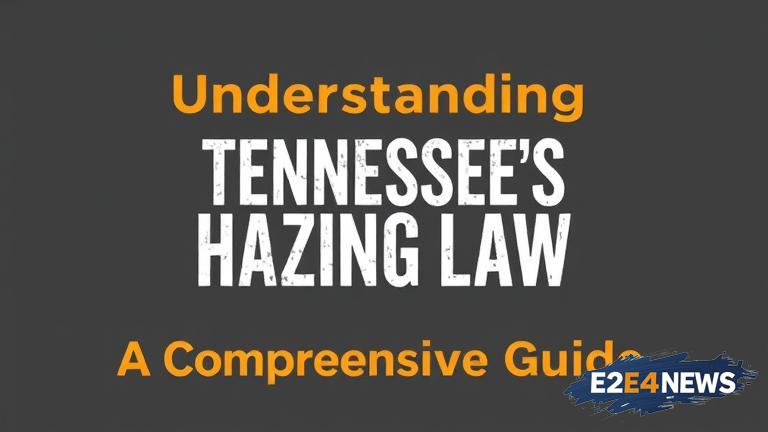Tennessee’s hazing law is a complex and multifaceted piece of legislation that aims to prevent and punish hazing incidents in the state. According to a local attorney, the law defines hazing as any intentional or reckless act that endangers the physical or mental health of an individual, and is often associated with initiation rituals or other forms of group behavior. The law applies to all individuals, including students, athletes, and members of social organizations, and can result in serious consequences, including fines, imprisonment, and civil liability. In recent years, there have been several high-profile hazing incidents in Tennessee, highlighting the need for greater awareness and education about the law. The local attorney emphasized that hazing is not limited to physical abuse, but can also include emotional and psychological manipulation, and that victims of hazing often suffer from long-term trauma and anxiety. The law provides a range of penalties for those found guilty of hazing, including fines of up to $2,500 and imprisonment for up to 11 months. In addition, victims of hazing may be entitled to civil damages, including compensation for medical expenses, lost wages, and pain and suffering. The local attorney noted that the law also requires schools and organizations to take proactive steps to prevent hazing, including providing education and training to students and members. Furthermore, the law allows for the suspension or expulsion of students who engage in hazing, and requires schools to report all incidents of hazing to the authorities. The local attorney emphasized that the law is designed to protect the safety and well-being of all individuals, and that it is essential for everyone to understand the consequences of hazing. In order to prevent hazing, it is essential to create a culture of respect and empathy, where individuals feel comfortable speaking out against abusive behavior. The local attorney also noted that the law is not intended to stifle free speech or creativity, but rather to ensure that all individuals are treated with dignity and respect. By understanding and complying with Tennessee’s hazing law, individuals and organizations can help to create a safer and more supportive environment for everyone. The law is an important step towards preventing hazing and promoting a culture of respect and empathy, and it is essential that everyone takes the time to understand its provisions and implications. In conclusion, Tennessee’s hazing law is a comprehensive and multifaceted piece of legislation that aims to prevent and punish hazing incidents in the state. By providing education and training, and by taking proactive steps to prevent hazing, individuals and organizations can help to create a safer and more supportive environment for everyone. The local attorney emphasized that it is essential for everyone to understand the consequences of hazing, and to take a proactive approach to preventing it. By working together, we can create a culture of respect and empathy, where everyone is treated with dignity and respect. The law is an important step towards achieving this goal, and it is essential that everyone takes the time to understand its provisions and implications. Additionally, the law has been praised for its comprehensive approach to addressing hazing, and for providing a range of penalties and consequences for those found guilty of hazing. The local attorney noted that the law is not just a response to hazing incidents, but also a proactive measure to prevent them from occurring in the first place. By educating individuals and organizations about the law, and by providing training and resources to prevent hazing, we can help to create a safer and more supportive environment for everyone. The law is an important step towards achieving this goal, and it is essential that everyone takes the time to understand its provisions and implications. Overall, Tennessee’s hazing law is a comprehensive and multifaceted piece of legislation that aims to prevent and punish hazing incidents in the state. By providing education and training, and by taking proactive steps to prevent hazing, individuals and organizations can help to create a safer and more supportive environment for everyone.
Tue. Oct 21st, 2025
